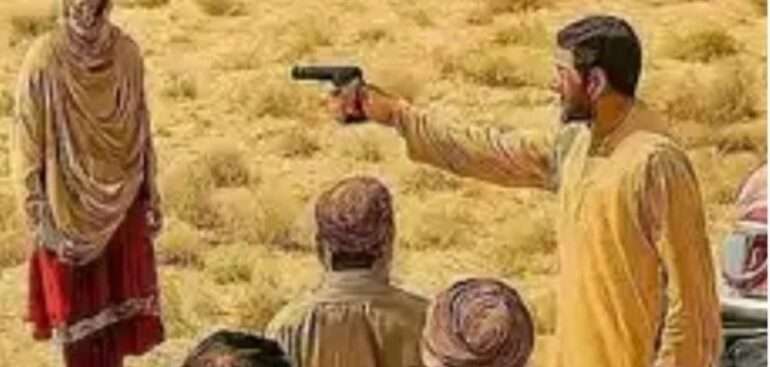In the grainy footage that now haunts Pakistan’s digital conscience, a woman walks steadily through a barren landscape. She is not fleeing. She is not pleading. She is walking toward death. Her name was Bano Satgzai, and beside her stood Ehsan Samalani—the man she had married of her own free will. Together, they defied a code that values silence over choice, control over love.
Clad in a modest traditional outfit, with her head covered and her eyes unflinching, Bano holds the Holy Quran—her only shield. Surrounded by a crowd of men, she hands the sacred book to one of them and says in her native Brahvi, “You only have permission to shoot me.” She then turns her back to them, stepping a few paces away—as if refusing to grant them the dignity of witnessing her final expression. Seconds later, three gunshots pierce the stillness, and she collapses onto the dust.
The Last Moments
The video doesn’t end there. What follows is a chaos of more gunfire, likely aimed at Ehsan. In a disturbing close-up shot, both bodies are seen on the ground—Bano lifeless, Ehsan still barely moving. One of the men steps closer and shoots him again—point-blank. The video cuts, but the horror lingers. This was not just a murder—it was a performance, captured and circulated for praise, for validation, for fear.
The incident took place in Sanjdi Deghari, on the outskirts of Quetta, under the jurisdiction of the Hana Urak police station. It reportedly occurred just days before Eid. The timing, the ritual, the recording—everything about it was deliberate.
A Society Complicit in Silence
The public outrage was immediate. The video went viral in hours. But for Advocate Jalila Haider, the pain wasn’t new. “The video wasn’t leaked—it was shared by the family. They want to be congratulated for this,” she said. She confirmed that the killing was approved by a jirgah, a tribal council that continues to operate as a parallel justice system, often with the silent blessing of the authorities.
“This area is under the control of the Frontier Corps (FC),” she said. “How did a convoy of armed men arrive, execute two people, and leave—without anyone noticing? The reality is, these executions happen not in secrecy, but in broad daylight—and with systemic support.”
Failures of the State
The killing has laid bare the failures of the state. The Chief Minister of Balochistan, Mir Sarfaraz Bugti, responded with public outrage and demanded an investigation into the matter. One suspect has reportedly been arrested, and terrorism charges have been filed. But these gestures feel painfully inadequate in the face of a repeating tragedy.
Since 2018, Human Rights Council of Balochistan (HRCB) has recorded at least 143 honour killings, the majority of them targeting women. From 2019 to 2024 alone, 212 people have been killed in the name of ‘honour’, according to the Aurat Foundation.
“These crimes continue because they are allowed to,” said HRCB. “The impunity is the oxygen that feeds these murders.”
A Culture of Violence Masquerading as Tradition
Civil society, especially women’s rights groups, has condemned the incident. Alauddin Khilji, the provincial director of Aurat Foundation, called the video “unbearable.” “It’s not just that they were murdered,” he said. “It’s that they were hunted—by armed men, in the name of honour, while the state stood aside.”
An anonymous activist expressed what many have long feared—that such acts are the logical outcome of a broken justice system. “In a society where justice is inaccessible, people begin to invent their own. And when tribal codes override national law, bullets become the final verdict,” she said.
She recalled how, years ago, after the burying alive of eight women in Naseerabad, a sitting MPA defended the act in parliament as a tribal tradition. “Nothing happened then. So why would anything change now?” she asked bitterly.
Tribal Areas: A Legal No Man’s Land
Much of this brutality is enabled by the legal vacuum in Balochistan’s tribal areas. “When you read our provincial laws, you often see a caveat: ‘This law extends to all areas, except tribal areas.’ Why?” asked the activist. “Why should any part of Pakistan be excluded from protection under the law?”
These exclusions act as shields for murderers. As long as tribal customs hold more sway than the Constitution, women like Bano will continue to be sacrificed on the altar of family honour.
Their Love Was Not a Crime
Bano and Ehsan’s story was not unique—but it was unforgettable. They didn’t ask for much—just the right to love. To marry. To live.
Instead, they became a warning. Their deaths, filmed and shared with pride, were meant to send a message. But what they leave behind is more powerful: a question that refuses to die.
How many more Banos must fall before this country chooses justice over custom?
Until that answer changes, the blood will keep seeping through the cracks of our silence. And the dust of Balochistan will remember the footsteps of a woman who walked, Quran in hand, toward her death—not with fear, but with dignity.
